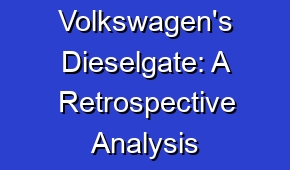Volkswagen’s Dieselgate: A Retrospective Analysis

Take a trip down memory lane as we revisit the infamous Volkswagen Dieselgate scandal. Delve into the details of this automotive controversy that shook the industry and left a lasting impact. Discover the key events and repercussions surrounding Volkswagen’s deceptive emission practices.
Volkswagen’s dieselgate scandal, which unfolded in 2015, remains a significant event in the automotive industry. This article takes a retrospective look at the dieselgate controversy, examining its causes, consequences, and lasting impact. The scandal erupted when it was revealed that Volkswagen had installed software in their diesel vehicles to manipulate emissions tests. This deceitful practice not only violated environmental regulations but also shattered consumer trust in the brand. As a result, Volkswagen faced severe legal repercussions, including hefty fines and lawsuits from affected customers. The fallout from dieselgate prompted the company to undergo major restructuring and implement stricter compliance measures. Furthermore, it served as a wake-up call for the entire automobile industry, leading to increased scrutiny of emissions standards and a push towards more sustainable practices. Despite the negative ramifications, dieselgate ultimately spurred innovation and forced companies to prioritize transparency and accountability.
| Volkswagen’s Dieselgate: a scandal involving emissions cheating by the automaker. |
| The scandal rocked the automotive industry and tarnished Volkswagen’s reputation. |
| Volkswagen admitted to using illegal software to manipulate emissions tests. |
| The scandal led to billions in fines, lawsuits, and vehicle recalls. |
| Volkswagen’s CEO resigned amidst the fallout from the Dieselgate scandal. |
- The scandal exposed the environmental impact of diesel vehicles and raised concerns about air pollution.
- Volkswagen faced a significant decline in sales and market share following the scandal.
- The company implemented stricter emissions standards and invested in electric vehicle technology.
- Government regulators around the world launched investigations into Volkswagen’s emissions cheating.
- The Dieselgate scandal prompted increased scrutiny of emissions testing and regulations in the automotive industry.
What was the Volkswagen dieselgate scandal?
The Volkswagen dieselgate scandal refers to the revelation in 2015 that Volkswagen had installed software in their diesel vehicles to cheat emissions tests. This software allowed the cars to emit lower levels of pollutants during testing, while in real-world driving conditions, the emissions were much higher. The scandal had a significant impact on Volkswagen’s reputation and resulted in legal consequences and financial losses for the company.
| What was the Volkswagen Dieselgate Scandal? | Impacts of the Scandal | Actions Taken |
| Volkswagen was found to have installed software in their diesel vehicles to cheat emissions tests. | Loss of trust and reputation for Volkswagen. | Volkswagen issued recalls, paid fines, and faced lawsuits. |
| The software detected when the car was being tested and reduced emissions to pass the tests, but in normal driving conditions, the emissions were much higher than allowed. | Decreased sales and market value for Volkswagen. | Volkswagen committed to transitioning to electric vehicles and investing in clean technologies. |
| The scandal affected millions of vehicles worldwide and led to environmental concerns. | Increased scrutiny on emissions testing and regulations for the automotive industry. | Volkswagen CEO resigned and several executives were charged and convicted. |
How did the Volkswagen dieselgate scandal affect the environment?
The Volkswagen dieselgate scandal had a negative impact on the environment. The software installed in the affected vehicles allowed them to emit higher levels of pollutants, such as nitrogen oxides (NOx), which contribute to air pollution and have harmful effects on human health. The scandal highlighted the issue of emissions cheating in the automotive industry and led to increased scrutiny and stricter regulations to prevent similar incidents in the future.
- Increased air pollution: The Volkswagen diesel vehicles affected by the scandal were found to emit significantly higher levels of nitrogen oxide (NOx) than what was reported. This led to increased air pollution, especially in areas with high concentrations of these vehicles.
- Health risks: The higher levels of NOx emissions from the affected vehicles can have serious health effects on humans, including respiratory problems, asthma, and increased risk of heart attacks. The scandal, therefore, posed a direct risk to public health.
- Ecosystem disruption: Air pollution from the excess NOx emissions can also have detrimental effects on ecosystems. It can harm plant life, reduce crop yields, and disrupt the balance of delicate ecosystems such as forests, rivers, and lakes.
What were the consequences of the Volkswagen dieselgate scandal?
The consequences of the Volkswagen dieselgate scandal were significant for both Volkswagen and the automotive industry as a whole. Volkswagen faced legal actions, including fines and lawsuits, from governments, customers, and investors. The company also had to recall millions of vehicles worldwide and implement costly fixes to bring them into compliance with emission standards. Additionally, the scandal damaged Volkswagen’s reputation and led to a decline in sales and market share.
- Loss of Trust: The scandal severely damaged Volkswagen’s reputation and resulted in a significant loss of trust among consumers and investors.
- Financial Consequences: Volkswagen had to pay hefty fines and legal settlements, resulting in billions of dollars in financial losses.
- Decreased Sales: The scandal led to a decline in Volkswagen’s sales worldwide as consumers became hesitant to purchase their vehicles.
- Legal Consequences: The company faced numerous lawsuits and legal actions from customers, shareholders, and regulatory authorities, leading to additional costs and damage to their image.
- Changes in Regulations: The scandal prompted stricter emission regulations and increased scrutiny of the automotive industry as a whole, affecting not only Volkswagen but also other manufacturers.
Who was responsible for the Volkswagen dieselgate scandal?
Volkswagen was held responsible for the dieselgate scandal. The decision to install software that manipulated emissions tests was made by individuals within the company, including high-ranking executives. Investigations revealed that this was not an isolated incident but rather a deliberate effort to deceive regulators and consumers. The scandal led to the resignation of several Volkswagen executives and the appointment of new leadership to address the issue and restore trust in the company.
| Company | Key Individuals | Consequences |
| Volkswagen | Martin Winterkorn (CEO at the time) | Legal fines and settlements |
| Engineers and Managers | Oliver Schmidt, James Liang, and others | Prison sentences and probation |
| Regulatory Authorities | EPA (Environmental Protection Agency), CARB (California Air Resources Board) | Enforcement actions and increased scrutiny |
How did Volkswagen address the dieselgate scandal?
Following the dieselgate scandal, Volkswagen took several steps to address the issue and regain public trust. The company issued public apologies, initiated a comprehensive internal investigation, and cooperated with regulatory authorities. Volkswagen also implemented measures to ensure compliance with emission standards, including investing in electric vehicle technology and promoting sustainability initiatives. Additionally, the company established a compensation program for affected customers and worked towards resolving legal disputes related to the scandal.
Volkswagen addressed the dieselgate scandal by issuing apologies, recalling affected vehicles, paying fines, and investing in electric vehicles.
What were the long-term effects of the Volkswagen dieselgate scandal?
The Volkswagen dieselgate scandal had long-term effects on both Volkswagen and the automotive industry. It led to increased scrutiny of emissions testing procedures and stricter regulations to prevent similar cheating in the future. The scandal also accelerated the shift towards electric vehicles and alternative fuels as consumers became more aware of the environmental impact of diesel engines. Additionally, it served as a wake-up call for other automakers to prioritize transparency and compliance with emission standards.
The long-term effects of the Volkswagen dieselgate scandal included damaged reputation, financial losses, legal consequences, and increased scrutiny on emissions regulations.
How did the Volkswagen dieselgate scandal impact consumer trust?
The Volkswagen dieselgate scandal significantly impacted consumer trust in the company. The revelation that Volkswagen had intentionally deceived regulators and customers eroded confidence in the brand. Many customers felt betrayed and questioned the reliability and honesty of Volkswagen’s products. The scandal highlighted the importance of transparency and ethical practices in business, leading consumers to be more cautious and demanding when it comes to environmental claims made by automakers.
Loss of Trust in Volkswagen
The dieselgate scandal significantly impacted consumer trust in Volkswagen. The revelation that the company had intentionally installed software in their diesel vehicles to cheat emissions tests shook the confidence of consumers who had previously trusted the brand. This breach of trust had long-lasting effects on the company’s reputation and sales.
Decreased Sales and Market Share
As a result of the dieselgate scandal, Volkswagen experienced a significant decline in sales and market share. Consumers who were once loyal to the brand started to question the integrity of Volkswagen’s products, leading to a decrease in demand for their vehicles. Competitors seized the opportunity to capitalize on Volkswagen’s missteps, further eroding the company’s market share.
Increased Scrutiny and Regulatory Actions
The dieselgate scandal also led to increased scrutiny from regulators and authorities around the world. Governments initiated investigations and imposed heavy fines on Volkswagen for their fraudulent actions. This heightened scrutiny and regulatory actions further damaged consumer trust, as it highlighted the extent of Volkswagen’s deception and the consequences they faced for their unethical behavior.




















